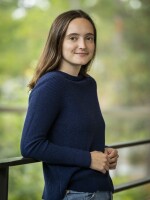This coverage is made possible through a partnership between IPR and Grist, a nonprofit environmental media organization.
Regenerative agriculture refers to practices, like cover crops, that advocates say are better for the environment and the climate compared to conventional farming.
For the past year, the film department at Interlochen Center for the Arts has worked with students on the Greenacres Film Project, a documentary focused on regenerative agriculture and other farming practices in northern Michigan. It's funded by the Greenacres Foundation, a nonprofit from Ohio.
IPR's Izzy Ross talked to director Nathan Buck and producer Claire Hannah Collins about the process of exploring agriculture and environment with students in northern Michigan.
This week, NPR did a deep dive into the promise — and limits — of regenerative agriculture, and exploring common claims, like whether and how much carbon these practices can store in the soil. Read more here.
Listen to the interview with the audio player at the top of this story.
Interlochen Center for the Arts owns IPR's broadcasting license. It has no role in decisions about our news coverage, which are made independently by the IPR newsroom.
Read a transcript of the interview here:
NATHAN BUCK: I'm Nathan Buck. I'm an instructor of film and new media at Interlochen Center for the Arts, and I'm also the director of the Greenacres project.
CLAIRE HANNAH COLLINS: I'm Claire Hannah Collins. I'm also an instructor at Interlochen in the film department, and I am the producer of this exciting documentary initiative.
IZZY ROSS: I'd like to start off by asking, what is Greenacres and what is this project about?
BUCK: Greenacres is a foundation in Cincinnati that is dedicated to education about regenerative farming, a technique of farming which is mainly concerned with growing and or building healthy soil.
COLLINS: Greenacres gifted Interlochen with funding to create a feature length documentary about regenerative farming, and we are doing this in the film and new media department in collaboration with our students.
Our students are central to this whole thing. They're behind the camera. They're doing research with us. They're in front of the camera, sharing their story of learning this information and figuring out how it applies to their lives.
Documentary filmmaking — and as it turns out, farming — are really about relationship building. So the first semester was really us getting to know our students, getting to know the farmers in this area, figuring out what is the story that we're all going to work together to tell. That's kind of how it's evolving.
ROSS: This week is all about climate and how climate relates to us, personally in our lives, and what people locally in northern Michigan and across the Great Lakes are doing about climate change. What is the relationship between regenerative agriculture and climate?
COLLINS: I think at this point it's fairly widely known that conventional agriculture has devastating environmental impacts, this is providing tools that can counter that, that can actually help us, you know, get healthier food in a way that's beneficial to our environments.
When thinking about regenerative agriculture as a framework for understanding food systems as an ecological system, there's so many opportunities for us to grow food in a way that is better for our environment. We've been learning about biochar, which is a practice that provides nutrition to the soil and also sequesters carbon. One of the things about regenerative agriculture that has resonated with me is that it provides a framework for thinking about food systems as an ecosystem and not just a system of like production, commodification of food.
ROSS: What do you hope that this film will add to the discussion or do in a different way?
BUCK: A lot of the existing films about regenerative farming — there are many, many excellent films — they tend to take a top down approach, in the sense that you have a lot of experts and a lot of kind of star practitioners of this technique who are featured, and they would tend to jump around from one topic to another, from one location to another, to give kind of a macroscopic view of regenerative farming.
We felt that we didn't want to just do that again. Our approach is really to look at a group of young people in a boarding school in northern Michigan who are learning about regenerative farming, and they're looking at their immediate environment, what they're eating in the cafeteria, what the farmers in their community are doing, and becoming empowered to change the system.
The more we got to know our students, and the more they got to know about the subject of regenerative farming, the more we saw that our role as professional filmmakers was to fade into the back and let the students get in front of the story, both helping to really guide the story, and also the students really should be prominently behind and in front of the camera.
ROSS: How did you start off thinking about this project, and how has that thinking and approach changed over over the process of filmmaking and over the past year that you've been working on it?
COLLINS: I'll say for me and my relationship to this, I think the more we've worked on this with our students, the more I've seen us all learn to love where we're living more. We've gotten to meet the people who are growing food around here and get to know them and be friends with them, and that's been really cool, that's been so inspiring to me, of like, how do we tell this story? You know, it's a story that's really personal and has so much beauty.
ROSS: Thank you both so much for taking some time to talk today.
BUCK: Thank you very much for having us.
COLLINS: Thanks for having us.



